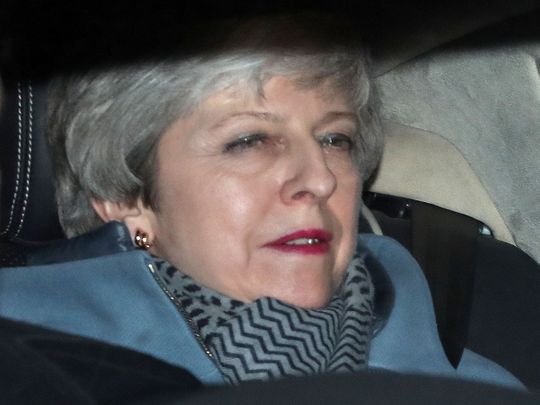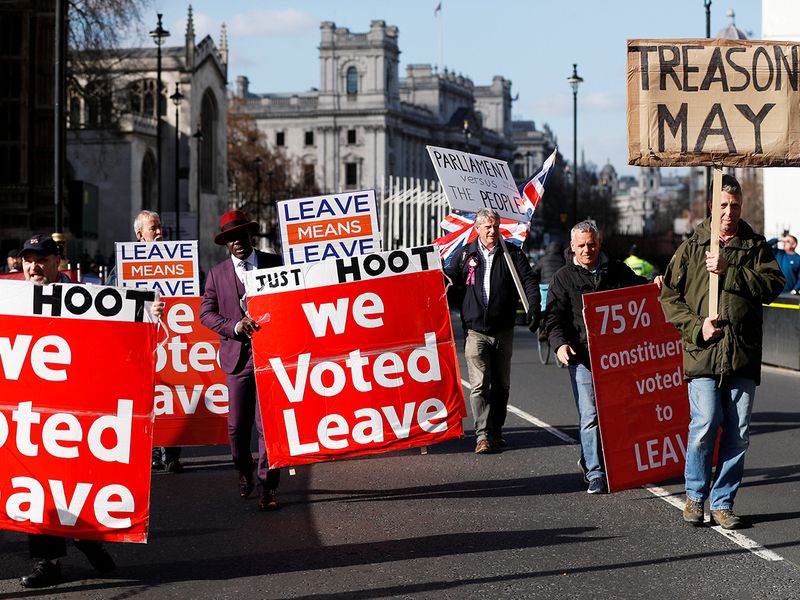
London: British Prime Minister Theresa May failed to sway hardline opponents of her European Union divorce deal on Wednesday with an offer to quit, but parliament’s bid to agree an alternative fell short, leaving the Brexit process as deadlocked as ever.
May told her Conservative lawmakers she would step down if her Brexit deal was finally passed by parliament at the third attempt, in a last-ditch bid to win over many of her party’s eurosceptic rebels.
But some were unmoved and the Northern Irish party crucial to getting the agreement through said it would reject the deal again.
Britain was supposed to leave the bloc on Friday but Brussels agreed last week to put back the divorce date until April 12 to give it a chance to resolve a three-year crisis that has split the country down the middle.
However, it still remains uncertain how, when or even whether the United Kingdom, the world’s fifth-biggest economy, will leave the EU. The possibilities that it will leave with no deal to soften the shock to its economy, or delay the departure date to hold a general election, have increased as other options fade.
While May’s deal continued to stumble, an attempt by parliament to take control of the process by holding a series of indicative votes on other options produced no immediate way through the impasse.
None of the proposals, many of which involved closer alignment with the EU than May envisages, won the support of a majority of lawmakers.

“In a spectacular display of indecision, the House of Commons has voted against remaining in the EU and every version of leaving the EU,” tweeted James Cleverly, the Conservative Party’s deputy chairman.
Nevertheless, some proposals fared better than May’s deal had done two weeks ago, and parliament was due to hold more indicative votes on Monday after refining the options most likely to secure a majority.
Desire for new approach
Many Conservative eurosceptics had made clear they would only consider supporting May’s deal if she gave a firm commitment to resign, hoping a new leader would be more sympathetic to their views when negotiating the terms of Britain’s future relationship with the EU.
“I have heard very clearly the mood of the parliamentary party,” May told a meeting of Conservative lawmakers (MPs).
“I know there is a desire for a new approach and new leadership in the second phase of the Brexit negotiations and I won’t stand in the way of that.” But within hours of May’s offer, the Democratic Unionist Party, which props up her minority government, said it would vote against the deal if May brought it back a third time.
“We’re in a situation where we cannot sign up to the Withdrawal Agreement,” DUP leader Arlene Foster said.
The government gave itself the option of bringing May’s deal back to parliament on Friday, although speaker John Bercow repeated his warning that he would not allow a third vote unless the motion had changed substantially since its last defeat.
May, who voted to remain in the EU in the 2016 referendum, had already promised to step down before the next election, due in 2022.
Her deal, defeated in parliament by 149 votes on March 12 and by 230 votes on Jan. 15, means Britain would leave the EU single market and customs union as well as EU political bodies.
But it requires some EU rules to apply unless ways can be found in the future to ensure no border posts need to be rebuilt between British-ruled Northern Ireland and EU member Ireland.
Many Conservative rebels and the DUP object to this “Irish backstop”, saying it risks binding Britain to the EU for years.
To succeed, May needs at least 75 lawmakers to come over to her side.
After the ERG met, a spokesman said: “There is no way enough votes are coming out of that room to put the (Withdrawal Agreement) through.”
‘It was inevitable’
While May was addressing her lawmakers, MPs in the main chamber debated eight other Brexit options, ranging from leaving abruptly with no deal to revoking the divorce altogether.
While there was no majority support for any, the option calling for a referendum on any departure deal, and another suggesting a UK-wide customs union with the EU, won more votes than May’s deal did two weeks ago.
Oliver Letwin, a Conservative former cabinet minister who led parliament’s unusual power grab, said it had been expected that none would immediately win a majority, and lawmakers would have another chance on Monday.
The uncertainty around Britain’s most significant political and economic change since World War Two has left allies and investors aghast. Sterling dipped after Wednesday’s events.
If May’s deal were to pass, her office said there would be a contest to replace her after May 22, when Britain would leave the EU.
She would also become the fourth Conservative prime minister in a row to have fallen foul of divisions over Europe within her centuries-old party, following David Cameron, John Major and Margaret Thatcher.
Most voters think the Brexit negotiation has been handled badly and there may now be a slight majority for staying in the EU, recent polls suggest. Many Conservative MPs say May herself has caused the chaos by not negotiating harder with the EU.
“It was inevitable and I just feel she’s made the right decision. She has actually read the mood of the party, which was a surprise,” said Conservative lawmaker Pauline Latham.
(Writing by Guy Faulconbridge and Michael Holden; additional reporting by Paul Sandle, Kate Holton, William Schomberg, Elisabeth O’Leary, Costas Pitas, Alistair Smout, Andy Bruce, David Milliken and James Davey; Editing by David Clarke and Kevin Liffey)
2.18am
British MPs on Wednesday voted against all eight alternative Brexit options aimed at overcoming the deadlock over Prime Minister Theresa May’s unpopular European Union divorce deal.
The options being voted on included negotiating for closer economic ties with the EU after Brexit, holding a public vote on any deal or stopping Brexit altogether.
11.02pm
UK parliament's debates on eight selected alternative plans (that don't include May's plan) has ended and the MPs have been requested to vote. The results will be announced by the speaker later tonight.
9.50pm
Downing Street has now officially confirmed what the prime minister told MPs, BBC reported.
“This has been a testing time for our country and our party," she said.
"We’re nearly there. We’re almost ready to start a new chapter and build that brighter future. But before we can do that, we have to finish the job in hand."
“I have heard very clearly the mood of the parliamentary party. I know there is a desire for a new approach – and new leadership – in the second phase of the Brexit negotiations – and I won’t stand in the way of that."
“I know some people are worried that if you vote for the Withdrawal Agreement, I will take that as a mandate to rush on into phase two without the debate we need to have. I won’t – I hear what you are saying."
“But we need to get the deal through and deliver Brexit."
9.43pm
9.38pm
Conservative MP James Cartilage told the BBC that Mrs May told the 1922 Committee she will not be leader for next phase of Brexit negotiations.
"My recollection is that she said she would not remain in post for the next phase of the negotiations, the implication being that once the withdrawal agreement has passed, she would make way for someone else," he said.
Britain's divided parliament holds a flurry of votes Wednesday seeking a last-minute alternative to Prime Minister Theresa May's unpopular Brexit plan.
Three years of political turmoil that followed Britain's decision to break its near half-century bond with the European Union were meant to have ended on Friday with the formal completion of the divorce.
But no clear end is in sight and May finds herself under unrelenting pressure from both inside and outside her own party to resign.
Lawmakers have twice resoundingly rejected the agreement she concluded with Brussels over 17 months of acrimonious talks.
But House of Commons leader Andrea Leadsom said on Wednesday "there's a real possibility" that May will try again on Thursday or Friday.
"The objectives we should all have is being able to deliver Brexit," May told lawmakers on Wednesday.
"A way of granting Brexit is supporting the deal."
May is still desperately short of votes and a third successive defeat would weaken her further.
Deadline extension or not: repercussions
EU leaders have given Britain an extended deadline of April 12 to get May's deal ratified or find a new way out.
Failure to do either could result in the sides splitting without a plan forward - a scenario that frightens the markets and business on both sides of the Channel.
Britain could otherwise seek an even longer extension that would put it in the odd situation of having to take part in European Parliament elections nearly two months after it was supposed to have left.
"The prime minister is failing to deliver Brexit because she can't build a consensus," opposition Labour party leader Jeremy Corbyn told parliament.
"Either listen and change course or go. Which is it to be?"
16 proposals: Today’s vote
Parliament has decided to try to break the deadlock by giving itself the right to choose from a variety of alternatives to May's plan.
It will vote at 1900 GMT on options that range from a second referendum to recalling the EU withdrawal notice and maintaining ties with the bloc.
May's own deal is not one of the 16 proposals submitted for debate to parliament speaker John Bercow. He will announce the ones that are on the agenda at around 1530 GMT.
Time has been set aside on Monday for MPs to try and whittle down the most popular options to a final plan.
But the motions are non-binding and it will be tough for parliament to force May to back any proposal with which she disagrees.
May hopes, some fear
May will hope none of the alternatives earn majority support and that her own agreement ends up looking like the best option.
Her government is banking on anti-EU rebels getting frightened by the prospect of Brexit being either overturned or watered down.
She has already won the backing of Jacob Rees-Mogg - the ultra-conservative who heads the European Research Group (ERG) wing of her party that twice voted against the deal.
"I think we've got to the point where legally leaving is better than not leaving at all," he told BBC radio on Wednesday.
But the small Northern Irish party whose backing May relies on in parliament said on Tuesday it would rather see Brexit extended by a year than support her deal.
Other holdouts are making their votes contingent on May's promise to step down and let another leader negotiate the next stage of the process.
"If the prime minister announces a timetable of departure, I think that's going to swing a lot of people behind her deal, we could get it over the line," said Conservative MP Nigel Evans.
Rethink Brexit?
European leaders are watching the entire process with concern.
European Council President Donald Tusk urged EU lawmakers on Wednesday to remain open to a long postponement while Britain rethinks its stance.
"I said that we should be open to a long extension if the UK wishes to rethink its Brexit strategy, which would of course mean the UK's participation in the European Parliament elections," Tusk said.
He also pointed to the nearly six million signatures on an online petition in the past week asking the government to cancel Brexit.
"They may not feel sufficiently represented by UK Parliament but they must feel represented by you," he told European Parliament members in a tweet.












